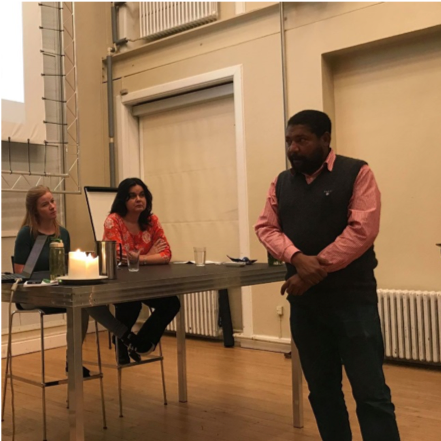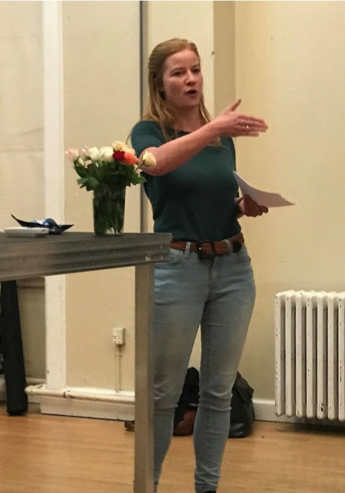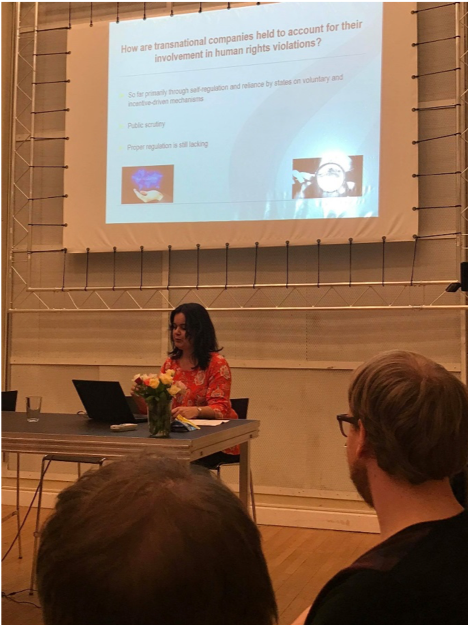Take-aways: Trade and Transnational Corporations – Attacks on Civil Society
Read our summary of the learning event on November 21st at Global Focus with Ali Chaucate, representative from Associacao de Apoio e Assistência Jurídica as Commundades (AAAJC), an organisation working to mobilise the local communities in Mozambique and increase their capacity to hold large corporations accountable to legislation and expose their links to politicians; Sanne Borges, Senior Advisor at Amnesty International Denmark, and Caroline Bjerglund Andersen, Project Manager at Africa Contact. The discussion was moderated by Marie Hagensen, Project Officer & Campaigns at Africa Contact.
Experiences from Mozambique
Ali Chaucate from the organisation AAAJC shared his experiences with working for better conditions for the local communities in the province of Tete. Mozambique through legal support and assistance.
According to Ali Chaucate, government and multinational corporations are the main promoters of action which undermines the rights of both local community and civil society. As a response AAAJC has as its main mission to “defend the rights of affected communities through awareness-raising activities regarding the rights granted to them by law”.
 Despite the first democratic constitution being established in 1990 the systematic violation of human rights remains a matter of concern, especially for citizens in general and for civil society in particular. The civil society organizations (CSOs) plays an important role impartially monitoring public policies and denouncing situations where the Governments role is questionable, for example uncovering “the issue of hidden debts” and other situations related to corruption. Ali Chaucate elaborated on the latter regarding the mining and hydrocarbons sectors:
Despite the first democratic constitution being established in 1990 the systematic violation of human rights remains a matter of concern, especially for citizens in general and for civil society in particular. The civil society organizations (CSOs) plays an important role impartially monitoring public policies and denouncing situations where the Governments role is questionable, for example uncovering “the issue of hidden debts” and other situations related to corruption. Ali Chaucate elaborated on the latter regarding the mining and hydrocarbons sectors:
“The civil society organizations have detected and denounced a series of irregularities intentionally promoted by the partnership by the Government and multinational companies, damaging the revenues collected for the State and the well-being of the citizens.”
The government has tried to limit the activities of the CSOs for example by increasing the payment needed to establish the right to impartial private press and formalization of civil society organizations.
In recent time Mozambique have witnessed various attacks on prominent dissidents most notably the death of French-Mozambican lawyer Gilles Cistac.
The living conditions in Tete has been worsened as a consequence of the exploitation of mining activity in the area. This includes intense pollution caused by open-bit mines and sacred community sites such as cemeteries been desecrated without any traditional ceremony.
The mining activity has consequences for the disintegration of the social structure of local communities resulting in alcoholism, delinquency, prostitution and diseases such as tuberculosis and HIV/AIDS.
According to Ali Chaucate “Mozambique is a country that has good laws, but they are not implemented because there is no will on the part of the Government”. The government views the CSOs as a threat to its non-transparent interest. Therefor it is important that the CSOs are involved in the political process in the future.
Initiatives to enhance systematic preventive measurement and reporting through the current processes in UN to create a binding treaty
According to Caroline Bjerglund Andersen from Africa Contact there is a “legislation gap” existing of two elements:
 Transnational companies can “shop” between national legislation. There are no binding international obligations regulating transnational companies conduct meaning that the mother company is rarely prosecuted.
Transnational companies can “shop” between national legislation. There are no binding international obligations regulating transnational companies conduct meaning that the mother company is rarely prosecuted. - National governments do rarely have any clear regulation or binding legislation towards companies, only voluntary guidelines to trust and no access to effective remedies.
There exists a biased trust from national governments towards the transnational companies. The citizens depend on national governments for access to justice, while companies have access to international tribunals. This highlights a form of hypocrisy in the international system.
The first steps toward a UN binding treaty have been taking through the first draft with focus on enforcement through national implementation and an international committee of experts. Some CSOs have uttered concern that no permanent, international court has been included, but Caroline Bjerglund Andersen emphasized that this is still only the first draft.
Both EU and Denmark are of the notion that voluntary UN Guiding Principles are enough, but the CSOs will keep working towards a more binding treaty.
Initiatives on business due diligence
Sanne Borges, Senior Advisor at Amnesty International Denmark, underlines the two main methods transnational companies are being held account for their involvement in human rights violations: self-regulation or incentive-driven mechanism. She stated:
 “In the last 10 years there has been some development, but it is far from sufficient because companies are still free to pick and choose what they actually report. What we need is legislation that ensures mandatory human rights due diligence, corporate liability and access to judicial remedies.”
“In the last 10 years there has been some development, but it is far from sufficient because companies are still free to pick and choose what they actually report. What we need is legislation that ensures mandatory human rights due diligence, corporate liability and access to judicial remedies.”
Sanne continued to elaborate on the difficulty of getting a majority in favour of mandatory legislation in the Danish parliament, because most political parties are in favour of voluntary initiatives. But we have seen examples of emerging laws in some European countries, which gives reason to believe that it can be done.
- Oprettet den .

